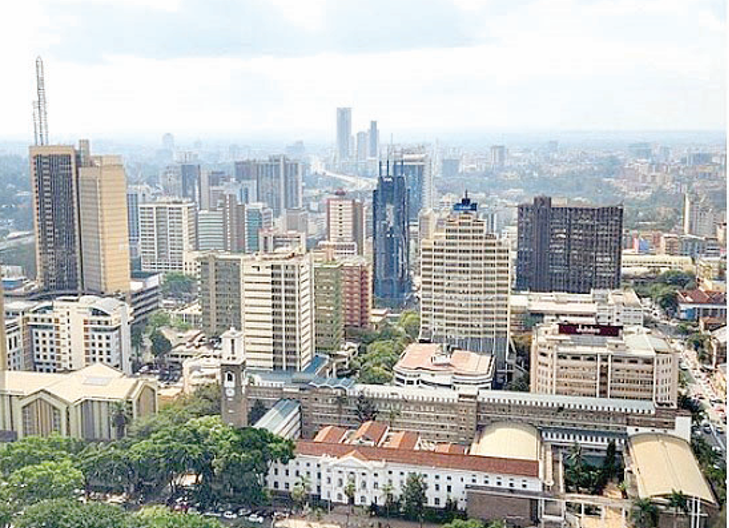Financing key in driving green, resilient urban growth

Urbanisation continues to be a major source of greenhouse gas emissions, with urban emissions per capita lower than national averages.
According to the World Bank, cities are responsible for approximately 70 per cent of global CO2 emissions, despite occupying only about 3 percent of the Earth’s land surface. Most of these emissions come from energy use in buildings, transportation, and the manufacturing industry.
As a result,climate change has taken grip of major cities around the world increasing their vulnerability to rising temperatures, extreme weather events, and resource shortages. From devastating floods to prolonged droughts, urban centers—especially in developing nations—are at the frontline of climate risks.
Building resilience is no longer optional but essential to safeguard communities, infrastructure, and economies. Africa cities expanding However, the challenge remains a lack of financial resources to support climate adaptation efforts.
Many cities struggle to invest in sustainable infrastructure, disaster preparedness, and resilient urban planning due to limited public funding and high debt burdens. In developing regions, where informal settlements are widespread, the absence of proper drainage, waste management, and cooling solutions further exacerbates the impact of climate shocks. Without adequate financing, cities are left exposed, leading to economic losses, displacement of vulnerable populations, and increased pressure on already strained public services.
As Africa cities expand at an unprecedented pace, and with 92 per cent already classified as being at extreme climate risk, the UrbanShift Africa Forum marked a decisive moment for resilient urban planning, sustainable investment, and climate action. With Africa projected to drive the majority of global urban growth in the coming decades, the forum focused on resilience, urban planning, and securing the financing required to build thriving, resilient cities for future generations.
“Many African cities are already on the frontline of the climate crisis, facing record-breaking temperatures, food insecurity and significant levels of climate migration. African mayors are showing considerable leadership, but they need the financial power to match their ambition,” said Mark Watts, Executive Director of C40 Cities during the Green and Resilient UrbanShift Africa Forum recently in Nairobi.
“Mayors are ready, communities are mobilising, and the solutions exist – now it’s time for governments and investors to step up. Unlocking finance for cities isn’t just the right thing to do; it’s the smartest possible investment in Africa’s future. Every dollar invested in sustainable urban development today will pay back in resilient economies, thriving communities, and a healthier planet for generations to come.”
Youth championing climate action Yvonne Aki-Sawyerr, Mayor of Freetown and Co-chair of C40 Cities says African cities are already at the vanguard of climate action and innovation with youth populations championing climate action and investing in their own futures.
“With approximately 70 percent of Africa’s population under the age of 35, young people are leveraging technology, creativity, and entrepreneurship to drive the shift toward sustainability. It is time for the international finance community to invest in their energy and ideas. We know the next generation is ready to lead the charge for a greener, fairer future, it is now the duty of city leaders to access the resources they need to create a greener, fairer future for all of us,” AkiSawyerr added.
Mayors, governors of some of the continent’s largest cities,in an open letter, urged African national governments to embed city’s green investment priorities into national budgets and plans. Additionally, the leaders implored governments to strengthen municipal finance and make government funding for cities more predictable.
They also demanded the removal of barriers to public-private partnerships to accelerate climate action projects. Unlocking funding for green infrastructure.
The mayors’ letter aims to unlock much-needed funding for green infrastructure and sustainable urban growth.
“African cities are increasingly vulnerable to extreme climate events, some facing devastating floods and others extreme drought. National climate action plans, co-developed with sub-national governments, can empower cities to facilitate resources and funding for more effective implementation, protection of urban residents and low-carbon, resilient development,” said Martin Krause, director, Climate Change Division, UNEP.
The forum also saw the release of a new Roadmap on Sustainable Finance Action and Advocacy for Global South cities, which outlines the practical steps that mayors and their teams can take to start acting and advocating for climate action.
This new resource from C40, UrbanShift and the Global Covenant of Mayors for Climate and Energy (GCoM) will help mayors access affordable financing for important projects like clean energy and public transport. The roadmap also recommends giving cities more financial independence, creating national platforms to coordinate efforts, and grouping projects together to attract greater investment.
“While cities in the Global South have bold climate ambitions, transforming ideas into bankable, implementable projects remains a challenge. The urgency for urban transformation is undeniable,” said Andy Deacon, Co-managing director, Global Covenant of Mayors for Climate and Energy (GCoM).
“Yet, without significant financial reform and a shift in investment flows, cities will remain unable to finance the climate solutions their communities desperately need. The new Roadmap on Sustainable Finance Action and Advocacy for Global South cities comes as a decisive step towards equipping mayors with the tools to access funding, advocate for fiscal decentraliation, and create viable pathways for green investments.”
African cities are rapidly building momentum in the fight against climate change. African cities and leaders will need access to new NBS funding sources and financing instruments to mitigate the growing climate challenges in the region.
“The global climate finance sector must play a larger role in meeting the demand for green investment across the region by increasing the amount of available climate capital and offering innovative and nimble finance solutions,” explained Pablo Lazo, Global Director, Urban Development, Cities Program, World Resources Institute. Strengthening municipal finance
According to Johnson Sakaja Governor of Nairobi strengthening municipal finance requires a multi-faceted policy approach that aligns budgetary provisions with climate action at both national and local levels. One critical reform is ensuring that municipal budgets integrate climate resilience and sustainability projects, enabling cities to allocate dedicated funding for infrastructure, waste management, and clean energy solutions.
“Beyond public funding, private sector partnerships and project-based investments play a crucial role in bridging financial gaps. Africa holds 60 per cent of the world’s solar energy potential and has vast carbon sinks, yet these resources remain underutilized as financial assets. Developing carbon markets, green bonds, and climate finance mechanisms can help municipalities unlock additional revenue streams while advancing environmental sustainability,” he noted.
“For years, discussions on municipal finance reforms have been ongoing, but the focus must now shift to practical implementation. To make a meaningful impact, municipalities must act swiftly to mobilize financial resources and scale up sustainable urban development initiatives”














